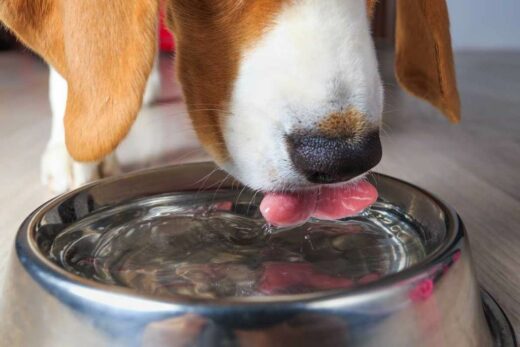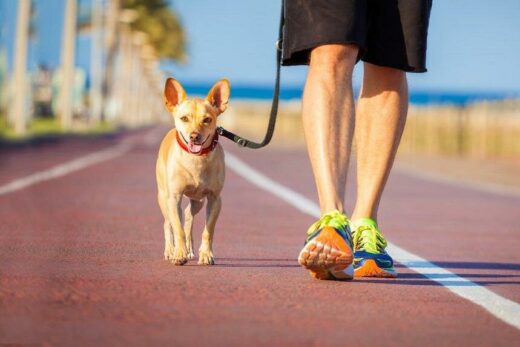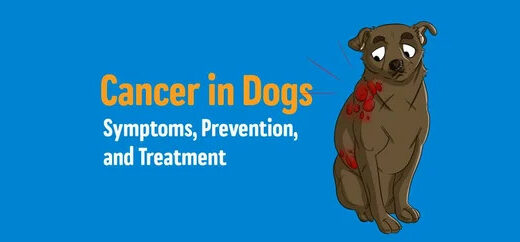Dogs are not picky eaters. They’ll wait for dinner table scraps or eagerly lick your plate. They’ll eat nearly anything. But what can dogs not eat? Beware – many foods that are safe for humans are not safe for dogs to eat. These toxic foods for dogs can cause serious illness in dogs and require emergency treatment if your buddy eats them. So let’s explore which foods your dog must avoid to stay safe and healthy.
Table of contents
- Stay on top of your dog’s wellbeing
- What dogs are at risk?
- Should your dog eat the same food as you?
- What can dogs NOT eat? Top 15 toxic foods for dogs
- 1. Coffee, tea, and other caffeinated beverages
- 2. Chocolate
- 3. Onions and garlic
- 4. Grapes & raisins
- 5. Milk and dairy products
- 6. Raw meat, eggs, and fish
- 7. Spicy food
- 8. Salt
- 9. Macadamia nuts, almonds, & pistachios
- 10. Mushrooms
- 11. Tomatoes & raw potatoes
- 12. Yeast & raw bread dough
- 13. Anything with Xylitol
- 14. Tobacco & nicotine products
- 15. Alcohol
- What to do if your dog eats something they shouldn’t have
- Keep your dog on a healthy diet and limit human foods
What dogs are at risk?
Any dog can be at risk for eating food that they shouldn’t. But dogs that are naturally curious, poke their nose into everything, or frequently put things in their mouth are at greater risk.
Small dogs may be at increased risk because lesser quantities of toxic food can cause a severe reaction due to the dog’s tiny size.
You know your dog’s personality and habits best, so it’s up to you as a pet parent to provide appropriate supervision at mealtimes, picnics, and family gatherings, and to store all foods toxic to dogs where your pup can’t reach it.
Should your dog eat the same food as you?
Dogs have nutritional needs that are different than those of humans. Their digestive system and teeth are adapted to an omnivorous diet, which means they can eat both plant and animal foods.
A few types of human food, such as some fresh fruits and vegetables and lean meat, are OK for dogs to eat in small quantities. But feeding your dog only table scraps will probably not meet your dog’s nutritional needs and could actually include food products that are harmful to your dog. As a bonus, if you stop offering table scraps, your dog will stop begging at mealtime.
Commercial or homemade dog food that meets the nutritional needs of your dog is better than table scraps. It includes the essential vitamins and minerals needed for your pup’s optimum health. And, you can be sure that it is safe for your pup to eat.
What can dogs NOT eat? Top 15 toxic foods for dogs
Human food is for people, not dogs. Many foods that we humans consume every day can cause vomiting, diarrhea, kidney problems, seizures, or even death in dogs, depending on the size of your dog and how much toxic food they eat. To keep your furry friend safe, become familiar with foods dogs cannot eat.
1. Coffee, tea, and other caffeinated beverages
You may need a caffeine jolt in the morning, but your dog does not. If your dog consumes large quantities of caffeinated coffee, tea, soda pop, or energy drinks, they can suffer from caffeine poisoning.
Symptoms of caffeine poisoning in dogs include heart palpitations, rapid breathing, muscle tremors, and restlessness. If you’ve gulped too many double espressos in one sitting, you understand what we mean. If your pup likes to poke around in the trash, be careful how you dispose of coffee grounds.
2. Chocolate

Many people are already aware that dogs shouldn’t eat chocolate, but do you know why? Chocolate contains theobromine, a substance that can cause tremors, abnormal heartbeat, seizures, and death in dogs. The darker the chocolate, the more theobromine it contains.
While you can safely enjoy this sweet treat, chocolate is off limits for your dog.
3. Onions and garlic
Onions and garlic contain sulfoxides and disulphides, which can damage your dog’s red blood cells and cause anemia. Symptoms of anemia include weakness, pale gums, lack of appetite, and dullness. The risk applies to all forms of onion and garlic, including raw, cooked, powdered, or dehydrated.
Don’t think your dog is likely to eat garlic or an onion? Make sure they aren’t nibbling on tidbits that fall to the floor while you chop veggies for dinner. Onion and garlic powder are present in many processed foods – even some baby foods – so always read labels carefully. Onions and garlic are part of the lily family, so other related plants such as leeks and scallions are also poisonous for dogs.
4. Grapes & raisins
Grapes and raisins are a healthy snack, right? Maybe for you, but definitely not for your dog. These sweet treats are highly toxic to dogs and can cause sudden kidney failure and death. Even one grape or raisin can cause symptoms that require immediate medical attention. Avoid keeping fresh grapes in your tabletop fruit bowl to reduce the risk of tragedy for your pup.
Raisins are dried grapes, so they are just as harmful to your dog as fresh grapes. Beware of raisins hiding in cookies and other treats that might tempt your dog.





